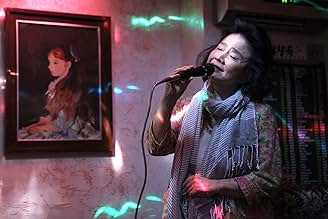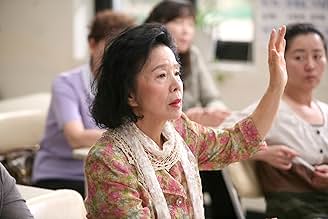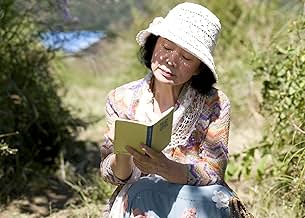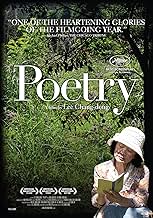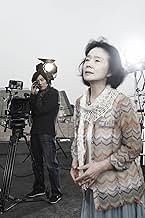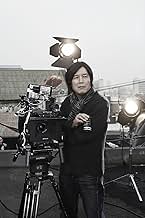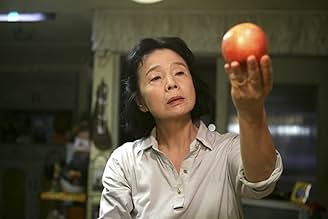NOTE IMDb
7,8/10
14 k
MA NOTE
Une femme dans la soixantaine, confrontée à la découverte d'un crime familial atroce et aux premiers stades de la maladie d'Alzheimer, trouve force et volonté dans un cours de poésie.Une femme dans la soixantaine, confrontée à la découverte d'un crime familial atroce et aux premiers stades de la maladie d'Alzheimer, trouve force et volonté dans un cours de poésie.Une femme dans la soixantaine, confrontée à la découverte d'un crime familial atroce et aux premiers stades de la maladie d'Alzheimer, trouve force et volonté dans un cours de poésie.
- Récompenses
- 27 victoires et 25 nominations au total
Avis à la une
There's an outstanding outward composure pervading this movie, to the point that it seems impossible not to feel in the end a sense of calm, although the cruelty of some situations. This is probably a typical feature of all oriental pictures and culture as well, but here it is most evident, almost therapeutic. The protagonist is a small, meek, cheerfully dressed, sixty-something woman, in the early stages of Alzheimer's, who has to look after her troublesome grandson, dramatically connected with a shocking event in the small Korean city where they live. It's a slow movie, which leaves ample scope to the unsaid and the unwritten, but dripping with strong and deep humanity. Mija reveals such determination in her simple and peaceful going on, holding on, she proves the real strength of real strong people, that strength that does not need any evident outward demonstrations, but only the inner will of a meek nature who continues to see the beauty of a flower or the perfection of an apple, and the beauty of poetry, of course, against the ugliness of men (and here the ugliness of a male chauvinist society is to be underlined). The movie reveals such delicacy, such subtlety and tact while approaching the most disturbing topics, that we as viewers can manage everything, feeling a kind of respect towards us, and feeling also grateful for that. Great work by the director Lee Chang-dong then, and standing ovation for Yun Jung-hee for her intense, poignant, stunning interpretation of Mija. The last shots on her finally achieved poem are petrifying and soothing at the same time, showing an incredible emotional intensity. These are movies that should reach the big screen more often and more widely.
POETRY (dir. Chang-dong Lee) POETRY is a slow-moving character drama which is disarmingly powerful, yet haunting and meditative. Mija is a sixty-six year old suffering from early onset Alzheimer's disease who lives in a rural Korean town with her indolent teen aged grandson, Jongwook. In an attempt to stimulate her cognitive abilities, she enrolls in a poetry class. Things are looking up until she learns that her grandson was involved in the suicide of one of his classmates. Jongwook and some of his friends had been sexually abusing a classmate, and this drove the young girl to take her life. Soon Mija is contacted by the fathers of the boys and learns that they want to pay the girl's mother a large sum of money to keep her from going to the authorities. In her poetry class at the community center Mija learns that in order to create poetry one must learn, 'to observe', 'to notice', and 'to witness'. The need for a heightened awareness or sensibility becomes the compelling dichotomy of the film. We observe that the fathers only focus on the ramifications of the incident on the lives of their sons, while Mija becomes moved and deeply empathizes with the loss of this innocent young girl to her family and the community. And, in the end Mija forces her grandson to face up to his responsibility, and she also constructs a loving and heartfelt poetic eulogy for the young girl. And, in a remarkable way of relating these two crucial events, the character of Mija is not even present as the actions unfold. Director, Chang-dong Lee, delivers a wonderful film which touches on a wide range of difficult subjects; poetry, dementia, sexual abuse and suicide, and casts an elderly semi-retired Korean actress as the star of the film. However, these kinds of mature topics and deliberate presentation are out of favor in Hollywood and unpopular with contemporary film audiences. I'm afraid that this film will never garner much commercial success, but if you take the time 'to witness', you will enjoy a truly rewarding cinematic experience.
Reading Poetry's summary, one sees a sentimental film. I surely wasn't sure if I wanted to see this or not. I am completely happy I did.
What we have here is a slow-paced, delicate film. But it doesn't sway in sentimentality. It's subtle, quiet, and perhaps the most gentle film of the year, but it also wallows in the study of a suburban woman and in many ways feels like a dark portrait of a story. Yoon Jeong-hee is magnificent! She conveys so much emotion, and we realize just how quickly we want to see her journey here. The direction is assured, quitely letting us explore, never calling attention to itself. The screenplay is brilliant, and has the ideal arc needed for a film like this.
There are many amazing moments in this film, moments that really grabbed me and that emotionally shook me. One of the best films of the year in an already amazing year for film.
What we have here is a slow-paced, delicate film. But it doesn't sway in sentimentality. It's subtle, quiet, and perhaps the most gentle film of the year, but it also wallows in the study of a suburban woman and in many ways feels like a dark portrait of a story. Yoon Jeong-hee is magnificent! She conveys so much emotion, and we realize just how quickly we want to see her journey here. The direction is assured, quitely letting us explore, never calling attention to itself. The screenplay is brilliant, and has the ideal arc needed for a film like this.
There are many amazing moments in this film, moments that really grabbed me and that emotionally shook me. One of the best films of the year in an already amazing year for film.
The theme of old age and illness find a new positive essence in poetry. A device to have even the elderly explore life in new and interesting ways. The excellent screenplay and brilliant directing from Chang-Dong Lee combined with an engaged ensemble cast and revealing cinematography, give place for an intimate interaction. The poets and aspiring poets fit well in this story of inner discovery. The inspiration is difficult to come by and external events will accentuate the duality of seeing life as an observer while also being an essential actor.
The multi-layered story has poetry, dialogue, imagery and much time for reflection. The film builds up to the last poem "Agnes' Song" by Mija Yang (the protagonist) which is powerful and perfect. Accentuated by it's accompanying images, it brings out life, beauty, sadness, acceptance, connection and so much more. The editing is especially effective here, but is extraordinary throughout. The ending confirms that the collections of individually intense and intelligent scenes witnessed transcends by transposing and transforming Mija and ultimately the viewer.
Hopefully this will inspire a perhaps much needed poetic view of this hypermodern world which can barely watch deliberate thoughtful meaningful measured movies like this, much less find and read a poem. Maybe this artistic beckon will even encourage someone to write one.
The multi-layered story has poetry, dialogue, imagery and much time for reflection. The film builds up to the last poem "Agnes' Song" by Mija Yang (the protagonist) which is powerful and perfect. Accentuated by it's accompanying images, it brings out life, beauty, sadness, acceptance, connection and so much more. The editing is especially effective here, but is extraordinary throughout. The ending confirms that the collections of individually intense and intelligent scenes witnessed transcends by transposing and transforming Mija and ultimately the viewer.
Hopefully this will inspire a perhaps much needed poetic view of this hypermodern world which can barely watch deliberate thoughtful meaningful measured movies like this, much less find and read a poem. Maybe this artistic beckon will even encourage someone to write one.
What a contrast to the average Hollywood product which highlights guns afire, frantic car chases and exploding buildings--noise and action aplenty: this subtle and enticing tale of self-realization is the antithesis of the action film, although within the first few minutes of the film, in the midst of children playing near a river, a body floats by and sets an odd tone for the remainder of the film. A grandmother who learns she has an incurable illness and who discovers her grandson is not merely a disaffected teen who cannot clean up after himself--but something worse-- the woman inexplicably enrolls in a poetry class and for the next two hours we are taken along her journey in a most leisurely fashion, a film with powerful cinematography and at last, a puzzling, thoughtful conclusion: if you want easy entertainment with pat answers, this is not your film. If you enjoy an immersion in another culture from another point of view, this might be a great treat for you--it was for me
Le saviez-vous
- AnecdotesThe idea for the film had its origin in a real-life case where a small town schoolgirl had been raped by a gang of teenage boys. When director Lee Chang-dong heard about the incident, it made an impact on him, although he hadn't been interested in basing a film on the actual events. Later, during a visit in Japan, Lee saw a television program in his hotel room. The program was edited entirely from relaxing shots of nature, "a peaceful river, birds flying, fishermen on the sea with soft new-age music in the background," and a vision for a possible feature film started to form. "Suddenly, it reminded me of that horrible incident, and the word 'poetry' and the image of a 60-year old woman came up in my mind."
- ConnexionsFeatured in At the Movies: Cannes Film Festival 2010 (2010)
Meilleurs choix
Connectez-vous pour évaluer et suivre la liste de favoris afin de recevoir des recommandations personnalisées
- How long is Poetry?Alimenté par Alexa
Détails
Box-office
- Budget
- 1 300 000 000 ₩ (estimé)
- Montant brut aux États-Unis et au Canada
- 356 149 $US
- Week-end de sortie aux États-Unis et au Canada
- 18 900 $US
- 13 févr. 2011
- Montant brut mondial
- 2 539 040 $US
- Durée2 heures 19 minutes
- Couleur
- Mixage
- Rapport de forme
- 1.85 : 1
Contribuer à cette page
Suggérer une modification ou ajouter du contenu manquant



